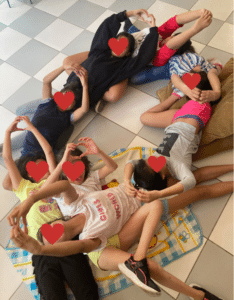Treasure House
Treasure House, based in the state of Jalisco, Mexico is a safe house – a place of refuge and restoration – for sexually exploited girls, many by their families, under the age of 16.
We are serving multiple girls that have experienced horrific events in their lives. Unfortunately, in Mexico, there is little emphasis on healing the victims. No doubt, early identification and intervention are critical to the ability to function as they grow older. Children have the amazing ability to overcome abuse, but someone must care. We started with one girl and have witnessed the importance of a multi-faceted intervention from a team approach. Our older girls, who have been with us the longest, are emerging from their shells and now take roles of helping with the younger girls. Our work has just begun and now our vision has expanded.

Familial Trafficking: Child sexual exploitation by family members for profit.
While the anti–human trafficking field has largely focused on steps to prevent and respond to sex and labor trafficking, one type of trafficking—family-facilitated human trafficking or familial trafficking—can slip through the cracks and be overlooked by law enforcement, child welfare agencies, educators, and others. The Journal of Family Violence notes that familial trafficking occurs when a family member (a father, mother, sibling, grandparent, uncle, or aunt) or a guardian (a foster parent or intimate partner of the parent) facilitates the trafficking.
This can include when parents or other family members allow sexual offenders to sexually abuse the victim in exchange for money, drugs, or a place to stay or when caregivers produce pornography of their children and sell, trade, or post the contents in exchange for money or other things of value.
In familial trafficking, the trafficker may be grooming and trafficking the victim at a much earlier age than in other types of trafficking notes. The abuse can be generational and normalized. Due to their young age, victims may not even be aware that they are victims and may not see the exchange of money or things of value. If reported, their experience may be misidentified as solely child sexual abuse or other crimes.
Substance use/addiction in the family was common in domestic minor familial sex trafficking cases, reported by justice professionals: 75 percent of the cases in the study involved family members selling a child in exchange for drugs. One professional noted that family trafficking is often prominent in communities where drug addiction to heroin, fentanyl, and meth is prevalent. Other risk factors noted include domestic violence in the home and acute poverty.
Additionally, the victim may find it challenging to speak out due to their loyalty to and reliance on their family. They may also feel deep shame about the situation and the need to protect their family. Victims may also fear what will happen once they report a family member, since the common approach is to permanently separate the victim from the offender. Given this alternative, many victims choose to stay with what they know.
